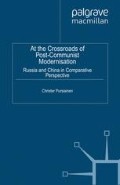Abstract
After more than two decades of reform, China and Russia have developed new hybrid forms of national capitalism and authoritarianism. Besides the domestic socioeconomic and political challenges, both countries have international ambitions. To be sure, China and Russia share a common denominator in the realm of foreign policy: to manage and, if possible, decrease the impact of US influence upon international affairs. But, putting this commonality aside, the two countries have different goals and conditions, and have adopted different foreign policy strategies to deal with the post-Cold War world order. Russia, seeing its current international standing in decline and being reduced to a mere energy supplier to the world market, is seeking to replay the end of the Cold War and to revive its great power ambitions. China has moved away from its former heavy reliance on bilateral relationships to working within numerous multilateral frameworks. Though this development has been welcomed in the international community, China’s more assertive behaviour in the maritime sphere has raised concerns about the implications for regional stability of China’s growing power. At the same time, China has not given up on its insistence on respect for sovereignty, nor has China’s leadership officially been swayed from the argument that, as a developing country, it must focus on raising the living standards of its own people before taking on more international responsibility.
Access this chapter
Tax calculation will be finalised at checkout
Purchases are for personal use only
Preview
Unable to display preview. Download preview PDF.
Notes
Robert D. Putnam, ‘Diplomacy and Domestic Politics: The Logic of Two-Level Games’, International Organization, vol. 42, no. 3, Summer 1988, pp. 427–460.
Sergei Medvedev, ‘NATO Enlargement and Russia: The Post-Madrid Agenda’, in Filip Tunjic (ed.), Stability and Security of Eastern and Southeastern Europe, Ljubljana: Ministry of Defense 1997, pp. 71–82.
Harry Harding, ‘China’s Changing Roles in the Contemporary World’ in Harry Harding (ed.), China’s Foreign Relations in the 1980s, New Haven and London: Yale University Press 1984 p. 179.
Jing Men, ‘China’s Peaceful Rise?’, Studia Diplomatica, vol. 56, no. 6, 2003, p. 17.
Deng Xiaoping, ‘Restore Agricultural Production’, 7 July 1962, in People’s Daily (ed.), Selected Works of Deng Xiaoping, Volume I (1938–1965), Beijing: Foreign Languages Press 1991.
Deng Xiaoping, ‘We Shall Concentrate on Economic Development’, in People’s Daily (ed.), Selected Works of Deng Xiaoping, Volume III (1982–1992), Beijing: Foreign Languages Press 1994.
Samuel S. Kim and Lowell Dittmer, ‘Whither China’s Quest for National Identity?’, in Dittmer and Kim (eds) China’s Quest for National Identity, Ithaca: Cornell University Press, 1993, pp. 258–9.
Shaun Breslin, ‘Understanding China’s regional rise: interpretations, identities and implications’, International Affairs 85: 4, 2009, p. 817.
Steven I. Levine, ‘Perception and Ideology in Chinese Foreign Policy’, in Thomas W. Robinson and David Shambaugh (eds), Chinese Foreign Policy: Theory and Practice, New York: Oxford Books 1994, p. 32.
Harry Harding, ‘China’s Changing Roles in the Contemporary World’, in Harry Harding (ed.), China’s Foreign Relations in the 1980s, New Haven and London: Yale University Press 1984, p. 179.
Robert Cooper, ‘The Post Modern State’, in Mark Leonard (ed.) Re-Ordering the World: The Long-term Implications of September 11th, London: Foreign Policy Centre 2002.
Zhang Yunling and Tang Shiping, ‘China’s regional strategy’, in D. Shambaugh (ed.), Power Shift: China and Asia’s New Dynamics, Berkeley: University of California Press, 2005, p. 51.
David Shambaugh, ‘Return to the Middle Kingdom: China and Asia in the early Twenty-first Century’, in D. Shambaugh (ed.), Power Shift: China and Asia’s New Dynamics, Berkeley: University of California Press 2005, p. 25.
Zhao Suisheng, ‘Chinese Foreign Policy under Hu Jintao: The Struggle between Low-Profile Policy and Diplomatic Activism’, The Hague Journal of Diplomacy 5 (2010), p. 363.
Bates Gill, Rising Star, China’s New Security Diplomacy, rev. ed. Washington DC: Brookings Institution Press 2010, p. 68.
Marshall Poe, The Russian Moment in World History, Princeton and Oxford: Princeton University Press 2006.
Shaun Breslin, ‘Understanding China’s Regional Rise: Interpretations, Identities and Implications’, International Affairs 85: 4, 2009, p. 818.
A.F.K. Organski and Jacek Kugler, The War Ledger, Chicago: Chicago University Press 1980.
Daniel Twining, As Asia Rises, Washington DC: German Marshall Fund of the United States 2010, p. 25.
Editor information
Editors and Affiliations
Copyright information
© 2012 Sergei Medvedev and Linda Jakobson
About this chapter
Cite this chapter
Medvedev, S., Jakobson, L. (2012). Sovereignty or Interdependency?. In: Pursiainen, C. (eds) At the Crossroads of Post-Communist Modernisation. Palgrave Macmillan, London. https://doi.org/10.1057/9781137284136_5
Download citation
DOI: https://doi.org/10.1057/9781137284136_5
Publisher Name: Palgrave Macmillan, London
Print ISBN: 978-1-349-34914-2
Online ISBN: 978-1-137-28413-6
eBook Packages: Palgrave Political & Intern. Studies CollectionPolitical Science and International Studies (R0)

